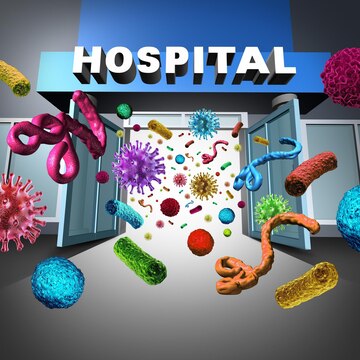War in Ukraine News
Not only has the ongoing conflict in Ukraine resulted in great suffering and displacement of people, but it has also raised concerns about the spread of infections resistant to drugs.

Antimicrobial resistance (AMR) is an urgent crisis facing Ukraine’s healthcare systems, according to a new report from the country’s health ministry and the Centers for Disease Control and Prevention (CDC).
The public’s health is seriously threatened by this concerning rise in superbug infections, not just in Ukraine but also in its surrounding nations and abroad.
War’s Effect on Healthcare Systems
Hospitals in Ukraine are suffering greatly as a result of the escalating conflict. Over the course of two months, researchers focused on 353 patients and surveyed them for infections and antimicrobial resistance (AMR) at three regional hospitals.
Remarkably, it was discovered that 14% of these patients had contracted infections during their hospital stays, and that 60% of these infections were resistant to carbapenem antibiotics, which are usually only used as a last resort for extremely serious bacterial infections.
The seriousness of the situation is further demonstrated by comparisons with a prior survey that was undertaken throughout the European Union in 2016–17.
Just 5.5% of patients in the previous survey reported getting infections while they were hospitalized, and 6.2% of those infections were resistant to antibiotics called carbapenems. The sharp rise in infection rates and antibiotic resistance highlights the pressing need for AMR intervention in Ukraine.
War’s Contribution to Antimicrobial Resistance
The study highlights the catastrophic effects of war on medical facilities and public health standards. Multidrug-resistant organisms have been found and are spreading as a result of pre-war antimicrobial resistance rates.
An increase in traumatic wounds, and the stress the war has placed on healthcare facilities. Not only does this situation threaten Ukraine, but it also threatens Europe and the entire world community.
One major factor in the spread of drug-resistant infections is the breakdown in hygiene, particularly handwashing practices.
The issue is further made worse by the irregular availability of testing for antibiotic susceptibility. The researchers stress that one of the biggest threats to global public health is bacterial antibiotic resistance, which is thought to be responsible for more deaths than HIV or malaria combined.
The Effects of Superbugs Worldwide
A major global public health concern that affects all nations is antibiotic resistance. According to estimates from the World Health Organization (WHO), bacterial AMR was directly responsible for 1.27 million deaths globally in 2019 and indirectly caused 4.95 million deaths as well.
The emergence of superbugs has significant economic ramifications in addition to endangering specific patients.
The UN Environment Programme issues a warning, stating that pharmaceutical, healthcare, and livestock farming pollution is further exacerbating the global superbug epidemic.
Due to the overuse of antibiotics in agriculture, animal farming in particular has been found to be a major source of bacteria that are resistant to antibiotics.
Drug-resistant infections can also spread due to poor sanitation, pharmaceutical pollution from drug manufacturing facilities, and improper waste management from healthcare facilities.
Needed to Take Quick Action
In order to address the growing threat of antimicrobial resistance in Ukraine and around the world, the report urges immediate action. To effectively combat AMR, the Ukrainian government must create locally driven and executed policies with assistance from foreign partners.
Building capacity is essential for stopping, identifying, and responding to antibiotic resistance, which will ultimately save lives and stop superbugs from spreading across borders.
In order to combat drug-resistant infections, the report also highlights the necessity of better hygiene practices, increased antibiotic stewardship, and the development of new antibiotics.
It is imperative to tackle the environmental factors and pollution that are fueling the superbug epidemic, including pharmaceutical pollution and livestock farming practices.
In order to address pollution and AMR in the developing world, governments and private sector investors in developed nations must play a significant role in providing resources and assistance. They can shield their own populations from the dangers of drug-resistant infections by taking this action.
In conclusion, the conflict in Ukraine has not only resulted in tremendous human suffering but has also raised the possibility of superbug infections, which is concerning. Antimicrobial resistance must be addressed immediately. This includes bettering antibiotic stewardship, hygiene standards, and lowering pollution from pharmaceuticals and livestock production. We can save lives, maintain the efficacy of antibiotics, and maintain global public health by acting decisively.
Keywords: drug-resistant systems, antimicrobial resistance, superbug infections, and war in Ukraine
READ MORE:
1. Health and Fitness Tips for You
2. Upcoming New Movies
3. Get New Jobs Directly From Companies FREE Visa
4.Latest News of Cryptocurrency and Bitcoin
5. Real Estate Business for you
6. Latest News
7. Best Insurance Policy for Everyone
READ MORE:
- 1. Strategic Management Process: Top5 Jobs In Dubai FREE VISA Apply Now
- 2. Vancouver Time fighting for $12,000 in travel insurance Nightmare FREE
- 3. DIABETIC DIET : A PROFESSIONAL’S GUIDE TO A WARM AND WELL-BEING
- 4. NICOLAS CAGE STATES : HE HAS 3 OR 4 MORE MOVIES LEFT NOW
- 5. EMPRESS CRACKS: FOR THE FIRST TIME SINCE APRIL
- 6. DESPITE MEANING: DESPITE HIGH RATES, MORE US HOME BUYERS ARE WILLING TO BUY
- 7. A 44-YEAR-OLD BOSTON WOMAN WAS KILLED BY A SHARK ATTACK IN THE BAHAMAS WHILE ON VACATION







